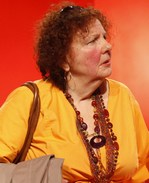SITE GUIDE
SEARCH
REVIEWS
REVIEW ARCHIVES
ADVERTISING AT CURTAINUP
FEATURES
NEWS
Etcetera and
Short Term Listings
LISTINGS
Broadway
Off-Broadway
NYC Restaurants
BOOKS and CDs
OTHER PLACES
Berkshires
London
California
New Jersey
DC
Connecticut
Philadelphia
Elsewhere
QUOTES
TKTS
PLAYWRIGHTS' ALBUMS
LETTERS TO EDITOR
FILM
LINKS
MISCELLANEOUS
Free Updates
Masthead
A CurtainUp Review
Havana Journal, 2004
|
But I've come to change. I know I have to change. See
something different. So I can get my voice back. — Ruth. Your voice? Reynaldo My country has taken it away from me. But here I feel so free. I'll get myself back. I know. I know I will! — Ruth. |

Crystal Field
(Photo: Carol Rosegg) |
The year is 2004. Ruth disdains George W. Bush's administration, United States politics, capitalism and the CIA. Director Stefanie Sertich manages to create an aura of uncertainty and insecurity befitting Ruth's paranoid hatred. Maruti Evans' set is simple—, an open stage with a dais, some furniture and a doorframe for entrances and exits. Three men, who when not in the scene sit around the dais with earphones in their ears, silently add to the secretive ambiance.
The play opens in Ruth's office at Columbia as she angrily reads her students' disappointing stories. Tired and discouraged, she takes swigs from the bottle of vodka in her desk drawer. When Ivan (David Skeist), an expatriate janitor from the USSR, comes in to clean her office, she dismisses him. Everyone has disappointed her and she is eager for her trip to Cuba.
Ivan comments, "From far away everything looks pretty". That seems true enough when Ruth gets to El Malecon, a seaside boulevard in Havana, Cuba where she is seduced by the sounds of the ocean, Cuba's sensual spirit and social equity, as well as by her conversation with a handsome Cuban, Reynaldo (Juan Javier Cardenas). Besides a physical attractionthey share a hatred of American politics.
Reynaldo says he is a serious composer, but what is his game? We may see clearly that he cannot be trusted, but Ruth is under his spell.
Political wordplay continues to drive the story. Later that day Reynaldo meets Tom (Liam Torres), an American tourist. Or is he? Perhaps Tom is a spy for the United States. Perhaps they are both spies. Tom tells Reynaldo only that he is a religious man who is interested in helping Cubans for a price, "communication.". He offers Reynaldo a book to read. It's the weighty, Moby Dick , with dollar bills taped on each page.
The linguistic fencing picks up in the evening as Ruth relaxes in the Nacional Hotel bar and speaks into her tape recorder. When Tom approaches her, she rebuffs him as another American tourist until he tells her he is here to meet his lover, a Cuban who cannot leave the country andasks Ruth for help.
No one is what he seems. But it becomes especially difficult to accept Ruth's combination of suspicion and naiveté.
Several months later, just before the election, we find Ruth back in her office at Columbia, still frustrated, still bitterly venting into her tape recorder. When Ivan comes in to clean, she admits she does not understand anything. Nor do we.
Crystal Field is convincing as Ruth— maddening, sympathetic, often difficult to watch in her alternating patterns of disappointment and trust. She is ruled by her lonely frustrations, believing anything that supports her views. Juan Javier Cardenas as Reynaldo weaves his various tales as smoothly and endlessly as the sounds of the sea waves. Liam Torres portrays Tom persuasively as a player trying to reel in Reynaldo and Ruth however he can. References to Yemaya, West African goddess of creation, add to the Cuban dichotomy of spiritualism and politics. Costumes by Michael Bevins serve the characters well.
In 90-minutes of theatrical discourse, the dialogue is unnaturally jerky and sluggishly repetitious, slowing the pace. The point is made and repeated as characters manipulate each other. In the final scene, as Ruth and Ivan reveal some confidences, cracks appear in her protective shield. "I'm beginning to understand", she tells him, obviously close to accepting the complications of idealism. Do not, however, expect any neat, tied up or direct answers in this play, nor any moments of intriguing drama.
|
Havana Journal , 2004 by Eduardo Machado Directed by Stefanie Sertich Cast: Crystal Field, Juan Javier Cardenas, David Skeist, Liam Torres Set and Lighting Design: Maruti Evans Costume Design: Michael Bevins Sound Design: Elizabeth Rhodes Running Time: 90 minutes with no intermission. Theater For the New City: 155 First Avenue (between 9th and 10th Streets). (212) 254-1109. theaterforthenewcity.net. Tickets: $15. Vouchers accepted. Performances: Thursday - Saturday at 8pm, Sunday at 3pm. Also March 31 at 8pm. Previews 3/26/10. Opening 4/3/10. Closing 4/18/10. Review by Elizabeth Ahlfors based on performance 4/2/10 |
|
REVIEW FEEDBACK Highlight one of the responses below and click "copy" or"CTRL+C"
Paste the highlighted text into the subject line (CTRL+ V): Feel free to add detailed comments in the body of the email. . .also the names and emails of any friends to whom you'd like us to forward a copy of this review. You can also contact us at Curtainup at Facebook , Curtainup at Twitter and at our Blog Annex |
|
Subscribe to our FREE email updates with a note from editor Elyse Sommer about additions to the website -- with main page hot links to the latest features posted at our numerous locations. To subscribe,
E-mail: esommer@curtainup.comesommer@curtainup.com
put SUBSCRIBE CURTAINUP EMAIL UPDATE in the subject line and your full name and email address in the body of the message -- if you can spare a minute, tell us how you came to CurtainUp and from what part of the country. |





